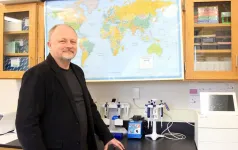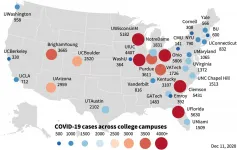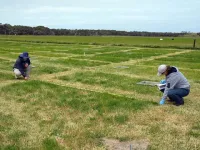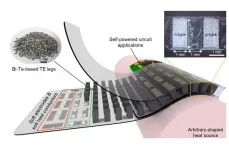(Press-News.org) Today, the largest study of genetic diversity in Ukraine was published in the open science journal GigaScience. The project was an international effort, bringing together researchers in Ukraine, the US and China and is the first fruits of this collaboration to set up a new Central Europe Center for Genomic Research in Ukraine. Led by researchers at Uzhhorod National University and Oakland University in the US, the work provides genetic understanding of the historic and pre-historic migration settlements in one of the key intersections of human trade and migration between the Eurasian peoples as well as the identification of genetic variants of medical interest in the Ukrainian population that differ from other European populations.
Two decades ago, after the publication of the draft of the human genome, one of the largest exploration projects in the genomics era began: The Human Genome Diversity Project (HGDP). This is an enormous international effort to map the entire pattern of human genetic variation across the world. To build this map, there have been numerous global surveys of individual genomes in a variety of geographic regions and populations, but crucial gaps still remain. One of the most notable is in Eastern-Europe and the Eurasian steppes.
Central to this is Ukraine, which is the largest country located fully in Europe. It is made up of a population formed via millennia of migration. This territory served as a key prehistoric and historic crossroads for the spread of humans across Europe and into Asia. Migration events here included modern human expansion into Neanderthal territory, the movement of nomads and early farmers just starting to domesticate plants and animals, the great human migrations during the Middle Ages, and the trade exchange routes of the Silk Road.
Lead investigator, Taras Oleksyk at Oakland University, says: "Our study shows there is significant genetic diversity in Ukraine, a country that had not been prioritized in genome surveys. We found more than 13 million genetic variants among the DNA samples -- nearly 500,000 of which were previously undocumented."
These variants, commonly known as mutations, are the result of evolutionary and demographic factors that have shaped Ukrainians' genetic makeup throughout history.
Oleksyk explains: "As humans moved across the world over millennia, they gained genetic mutations, often due to adaptation to their specific environments. These mutations have been passed down through generations, so when we look at genomes of Ukrainians and other populations, what we see is a reflection of their unique evolutionary histories."
The survey is an important part of understanding human diversity, as it shows the extensive breadth of genetic diversity in Ukraine -- a nation that was once thought to lack genetic relevance.
Oleksyk highlights this, saying their study shows that "Ukraine accounts for roughly a quarter of the genetic variation documented in Europe. It's a part of the world that cannot be ignored in future genetic and biomedical studies."
Investigation of genetic diversity, in addition to providing insight into human history, also plays an important role in identifying medically relevant mutations that differ between populations. In this study, the researchers looked for variants in the Ukraine population whose prevalence differed significantly compared to other European genome sequences openly available through the HGDP.
In particular, the study identified medically relevant mutations whose prevalence in the Ukrainian genomes differed significantly compared to other European genome sequences that are all openly available as part of the HGDP and 1000 genomes project. Some of the mutations identified have been linked to conditions such as breast cancer, autism and Leber Congenital Amaurosis (LCA), a rare inherited eye disease.
Compared to the other Europeans, the Ukrainians in the study had far fewer carriers of a mutation linked to breast cancer and LCA. However, they more often held a mutation associated with autism. Another mutation, known to inhibit a drug used to treat bone disorders, was less prevalent in the Ukrainians compared to the other Europeans. These findings contribute to a growing body of knowledge that could revolutionize modern medicine and provide more informed assessment of the medical requirements and resources needed in different areas, populations and peoples.
"With a deeper understanding of how mutations factor into disease, doctors can tailor treatments to people's genetic profile," said Oleksyk. "That's why it's important to have detailed descriptions of the world's genomes. This knowledge could profoundly impact human health, and even save lives."
In addition, Ukraine survey identified mutations that were prevalent in disease-associated genes, but whose precise effect is unknown. These mutations could be prime candidates for future research.
With these data now available, in addition to the findings in this work, researchers around the world can now access these data to carry out their own studies in areas from human biology and medicine to unraveling human history and prehistory.
INFORMATION:
The genomic data is openly available in GigaDB at http://gigadb.org/dataset/100835
and the EBI European Nucleotide Archive under Project: PRJNA661978.
Further Reading
Oleksyk TK; et al. Genome Diversity in Ukraine. GigaScience. 2021
doi:10.1093/gigascience/giaa159
https://academic.oup.com/gigascience/article-lookup/doi/10.1093/gigascience/giaa159
Contacts:
Scott Edmunds, Editor in Chief
GigaScience, BGI Hong Kong
Email: scott@gigasciencejournal.com
Sharing on social media?
Find GigaScience online on twitter @GigaScience; Facebook, and keep up-to-date with our blog.
About GigaScience
GigaScience is co-published by GigaScience Press and Oxford University Press. Winner of the 2018 PROSE award for Innovation in Journal Publishing (Multidisciplinary), the journal covers research that uses or produces 'big data' from the full spectrum of the biological and biomedical sciences. It also serves as a forum for discussing the difficulties of and unique needs for handling large-scale data from all areas of the life and medical sciences. The journal has a completely novel publication format -- one that integrates manuscript publication with complete data hosting, and analyses tool incorporation. To encourage transparent reporting of scientific research as well as enable future access and analyses, it is a requirement of manuscript submission to GigaScience that all supporting data and source code be made available in the GigaScience database, GigaDB, as well as in publicly available repositories. GigaScience will provide users access to associated online tools and workflows, and has integrated a data analysis platform, maximizing the potential utility and re-use of data.
College campuses are at risk of becoming COVID-19 superspreaders for their entire county, according to a new vast study which shows the striking danger of the first two weeks of school in particular.
Looking at 30 campuses across the nation with the highest amount of reported cases, experts saw that over half of the institutions had spikes - at their peak - which were well above 1,000 coronavirus cases per 100,000 people per week within the first two weeks of class.
In some colleges, one in five students had been infected with the virus by the end of the fall term. Four institutions had over 5,000 ...
A detailed description of how ovarian cancer cells adapt to survive and proliferate in the peritoneal cavity has been published in Frontiers in Oncology. Researchers show that structures inside the cells change as the disease progresses from benign to malignant, helping the cells to grow in an otherwise hostile environment of low nutrients and oxygen. Understanding how these cellular adaptations are regulated could herald new targeted treatment options against the fifth-leading cause of cancer-related deaths in women.
"Our study compared the structures inside cells representing different stages of ovarian cancer, including after aggregation, which enhances their survival," says Eva Schmelz, a Professor and Scientific Director at Virginia Tech University, USA, who led this research. "We found ...
The remote learning experience of parents who had their children at home in Spring 2020, as schools across the US closed during the United States' COVID-19 lockdown, was more positive than widely believed.
That is the suggestion from a new study published in the Journal of School Choice, which looked at the experience of a nationally representative sample of 1,700 parents stretching right across America.
On average only 44% of parents reported the online learning program required too much of parents, while 38% of parents said it was difficult for them to manage the online provisions.
However, worryingly, most parents (63%) believed remote learning caused their child to fall behind.
While the study focused ...
Yale researchers have devised a way to peer into the brains of two people simultaneously while are engaged in discussion. What they found will not surprise anyone who has found themselves arguing about politics or social issues.
When two people agree, their brains exhibit a calm synchronicity of activity focused on sensory areas of the brain. When they disagree, however, many other regions of the brain involved in higher cognitive functions become mobilized as each individual combats the other's argument, a Yale-led research team reports Jan. 13 in the journal Frontiers of Human Neuroscience.
"Our entire brain ...
A loss of biodiversity and accelerating climate change in the coming decades coupled with ignorance and inaction is threatening the survival of all species, including our very own, according to the experts from institutions including Stanford University, UCLA, and Flinders University.
The researchers state that world leaders need a 'cold shower' regarding the state of our environment, both to plan and act to avoid a ghastly future.
Lead author Professor Corey Bradshaw of Flinders University in Australia says he and his colleagues have summarised the state of the natural world in stark form to help clarify the gravity of the human predicament.
"Humanity is causing a ...
Tsukuba, Japan - Work causes so much stress that it's become a global public health issue. Stress's impact on mental and physical health can also hurt productivity and result in economic loss. A new study now finds that working people who regularly take walks in forests or greenspaces may have higher stress-coping abilities.
In a study published in Public Health in Practice, researchers led by Professor Shinichiro Sasahara at the University of Tsukuba analyzed workers' "sense of coherence" (SOC) scores, demographic attributes, and their forest/greenspace walking habits. SOC comprises the triad of meaningfulness (finding a sense of meaning in life), comprehensibility (recognizing and understanding stress), and ...
CLEVELAND, Ohio (Jan. 13, 2021)--If you're a bit more forgetful or having more difficulty processing complex concepts than in the past, the problem may be your menopause stage. A new study claims that menopause stage is a key determinant of cognition and, contrary to previous studies, shows that certain cognitive declines may continue into the postmenopause period. Study results are published online today in Menopause, the journal of The North American Menopause Society (NAMS).
It's commonly assumed that people's memories decline with age, as does their ability to learn new things and grasp challenging concepts. ...
The ability of our skin to protect us from chemicals is something we inherit. Some people are less well-protected which could imply an increased risk of being afflicted by skin disease or cancer. A new study from Karolinska Institutet in Sweden that has been published in Environmental Health Perspectives shows how the rate of uptake of common chemicals is faster in people with a genetically weakened skin barrier.
We are continually exposed to chemicals from many different sources, for example, food, hygiene products, cosmetics and textiles. Many people are also exposed to chemicals at their place of work which can constitute a work environment problem.
The protein filaggrin is important for the structure and moisture balance of the skin, properties that affect ...
January 13, 2021 - The element nitrogen is a double-edged sword. It is essential for growing plants and feeding people, but it is also a leading cause of pollution across the world. Only by using nitrogen more sustainably can the positive and harmful effects of nitrogen be balanced.
Xia (Emma) Liang, a member of the American Society of Agronomy, studies nitrogen loss during food production.
Liang and her team created a framework that accurately measures nitrogen loss across a wide variety of crops and food products. She recently presented their research at the virtual 2020 ASA-CSSA-SSSA Annual Meeting.
"This framework can capture the environmental impacts and societal costs of nitrogen ...
A thermoelectric device is an energy conversion device that utilizes the voltage generated by the temperature difference between both ends of a material; it is capable of converting heat energy, such as waste heat from industrial sites, into electricity that can be used in daily life. Existing thermoelectric devices are rigid because they are composed of hard metal-based electrodes and semiconductors, hindering the full absorption of heat sources from uneven surfaces. Therefore, recent studies were actively conducted on the development of flexible thermoelectric devices capable of generating energy in close contact with various heat sources such as human skins and hot water pipes.
The Korea Institute of Science and Technology (KIST) announced ...




